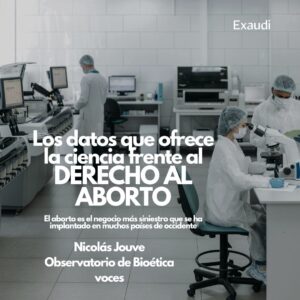It is actually an immense business that only economically benefits the centers where it is practiced, the “abortories.”
For those who have spent decades defending the importance of scientific data for the establishment of legal norms or laws that are fair and respectful of human life, the decision that has just been adopted, in a Congress held in Versailles, by a group of French deputies and senators, is devastating. The Assembly of France has decided to reform the Constitution to include abortion as a fundamental right.
Abortion cannot be a right, since it is contrary to life, and the right to life is the first and principal of Human Rights, enshrined in the French Constitution and in Western countries, as well as in the Universal Declaration of 1948 and in all the international treaties, conventions, and declarations that have been approved since then.
Science must be understood as a disinterested activity at the service of humanity. The Austrian jurist Karl Popper (1902-1994) said that: “What characterizes the man of science is not the possession of knowledge or irrefutable truths, but the disinterested and incessant search for truth […] the search for truth presupposes ethics”. For this reason, science should not be an activity interested in individual benefits and scientists should be valued when making decisions that affect people’s lives, since they are the ones who know best and can value the significance of their discoveries. . The fact is that the great lie about the nonexistence and, therefore, irrelevance of human life in the prenatal stage has gone very far, increasingly further if we consider the decision of the French constitutional reform, not in accordance with the real meaning of prenatal human life, but by virtue of an alleged “right to decide” and to “preserve a right threatened in other countries,” according to the initiative of President Emmanuel Macron.
There are two serious errors in this decision. One of a scientific nature and another of a legal nature. And among them is the lack of ethical reflection on the value of human life at all times and whatever its circumstances.
The first error, and for those who subscribe to this comment the main one, is the failure to consider scientific data on the fact of the existence of a human life, a third different from the father and mother, in the womb during pregnancy. . It is one more consequence of the utilitarian drift that drowns out the real meaning of scientific data on the initial stage of human life and that is misinterpreted or disguised with euphemisms to hide and manipulate its true meaning. The scientist can be required to be neutral with respect to the interests or desires that best suit society, but he cannot be asked to distort the true meaning of his discoveries to hide the truth of the natural phenomenon of life. At least in science, the end does not justify the means. One cannot deny the reality of a human life, a human being in formation, from the first moment of existence.
A drama with two victims
It will soon be 15 years since we presented and disseminated the “Madrid Declaration”, a Manifesto in defense of nascent human life, which promoted a great debate in favor of life and against the reform for the worse of the law of decriminalization of abortion which had been in force in Spain since 1985. In March 2009, nearly 3,000 professionals, most of them university professors and researchers, gynecologists, pediatricians and jurists, etc., among them nearly 200 academics from the royal academies of Medicine and Sciences , we signed this manifesto in which we pointed out the scientific data on the reality of human life in the embryonic and fetal phase. It is enough to remember some of the points that were included in this declaration: a) There is ample scientific evidence that life begins at the moment of fertilization; b) The embryo (from fertilization to the eighth week) and the fetus (from the eighth week) are the first phases of the development of a new human being and in the maternal cloister they are not part of the substantivity or of any organ. from the mother, although it depends on her for its own development…
The existence of prenatal life cannot be denied, nor its value lowered simply because it is not seen, or because it has not yet acquired the functional characteristics that are manifested in developed individuals of the human species. Life is not a matter of deadlines, but rather it is a reality that has existed since the formation of the zygote. The zygote is the first human bodily reality and this is not a question of ideas but of scientific data supported by Genetics, Cellular Biology, Embryology, etc.
The second error is of a legal nature. Far from representing the conquest of a right for women, abortion makes the woman responsible for a violent act against the life of her own child. Abortion cannot be a right, but rather it is a drama with two victims: one, the most vulnerable and defenseless, who dies, and the other, who survives and will suffer the consequences of a dramatic and irreparable decision. Added to this are the serious consequences for society. A society that becomes desensitized to the slaughter of hundreds of thousands of babies a year is a failed, sick and clearly decaying society.
What can we say, therefore, about the decision of the parliamentarians and senators of France? If the right to life is the main Fundamental Rights of Citizens, as has been maintained from the beginning in the French Constitution, how is the declaration of abortion as a fundamental right understood? From now on, where is the legacy of the Age of Enlightenment, freedom, equality and fraternity for human beings who are prevented from seeing the light? How can freedom from a crime become a right? pregnancy, even if unwanted, at the cost of the life of a child?
If abortion cannot be considered a medical act, the child dies, the mother suffers, and society loses its precious human resources for the future in demographic terms, it is practically impossible to grant this inhumane practice the status of a fundamental right. A so-called right that ignores the inalienable dignity of human life and that, for the only purpose it serves, is to worsen the demographic winter that many Western countries are suffering. In Spain, it is especially accused, due to the more than two and a half million human losses in the nearly 30 years of abortion laws. Abortion is probably the most sinister business that has been established in many Western countries. It is actually an immense business that only economically benefits the centers where it is practiced, the “abortories.”
A third point, which must serve as a link between the data provided by science and the decision to guarantee legal norms, is ethical reflection. In reality, science and ethics are inseparable, they are two sides of the same coin. The German humanist Hans Jonas (1903-1993) spoke about this in The Principle of Responsibility, pointing out that the “exercise of science implies ethics” and insisting that human survival depends on our efforts to care for future generations, and to our planet. Inspired by Kant and Christian humanism, he formulated the moral obligation to “act in such a way that the effects of our actions are compatible with the permanence of an authentic human life on earth.”
Therefore, the ethical assessment of the real data provided by science is transcendental and the basis for founding the laws or regulations that protect that reality. This is the correct order for an adequate analysis of any bioethical problem: first science, then ethics, and finally and in consideration of both, the law. Unfortunately, on the issue of abortion, the truth about the human reality of the life of the unborn is ignored, and the bottom line is… its elimination becomes a woman’s right.
The countdown to the end of abortion
However, as the truth ends up prevailing, there is hope that abortion will end up disappearing, as happened with slavery or racism in the past. Two recent rulings by the high courts of the United States, the cradle of the right to abortion, are relevant. First, the nation’s Supreme Court’s decision on June 22, 2022, to overturn the landmark Roe v. Wade, by which the constitutional right to abortion was ruled in 1973. In its ruling, the Court said states can ban abortion at any stage.
Secondly, on February 23, the Supreme Court of the State of Alabama just declared the protection of human embryos, considering that they are human beings, that is, people. The Court has ruled that an embryo kept in a fertility clinic freezer should be treated as the legal equivalent of an already born child or a fetus developing in the mother’s womb, which is perfectly correct from the perspective of Biology. Finally, a recognition of the data of science. With good judgment, Judge Jay Mitchell of the aforementioned court has pointed out that parents can sue for the death of a child regardless of its stage of development, embryonic, fetal or already born.
After these two historic rulings and, regardless of what the 14th amendment of the US Constitution dictates, which only considers someone who has already been born a person, abortion declines as a right. At this point, there are already 24 states in which laws have been enacted to completely prohibit or restrict abortion to certain circumstances in the nation in which abortion became a right.
We will have to wait for future events. But for now, the fact that while some go, others are back, represents an opening to hope. The countdown has begun for the end of abortion, the most abominable phenomenon of our time.
Nicolás Jouve – Member of the Bioethics Observatory – Emeritus Professor of Genetics – Former member of the Bioethics Committee of Spain
The data it offers
science versus
RIGHT TO ABORTION
Abortion is the most sinister business ever
implemented in many Western countries
Nicolas Jouve
Bioethics Observatory
voices











